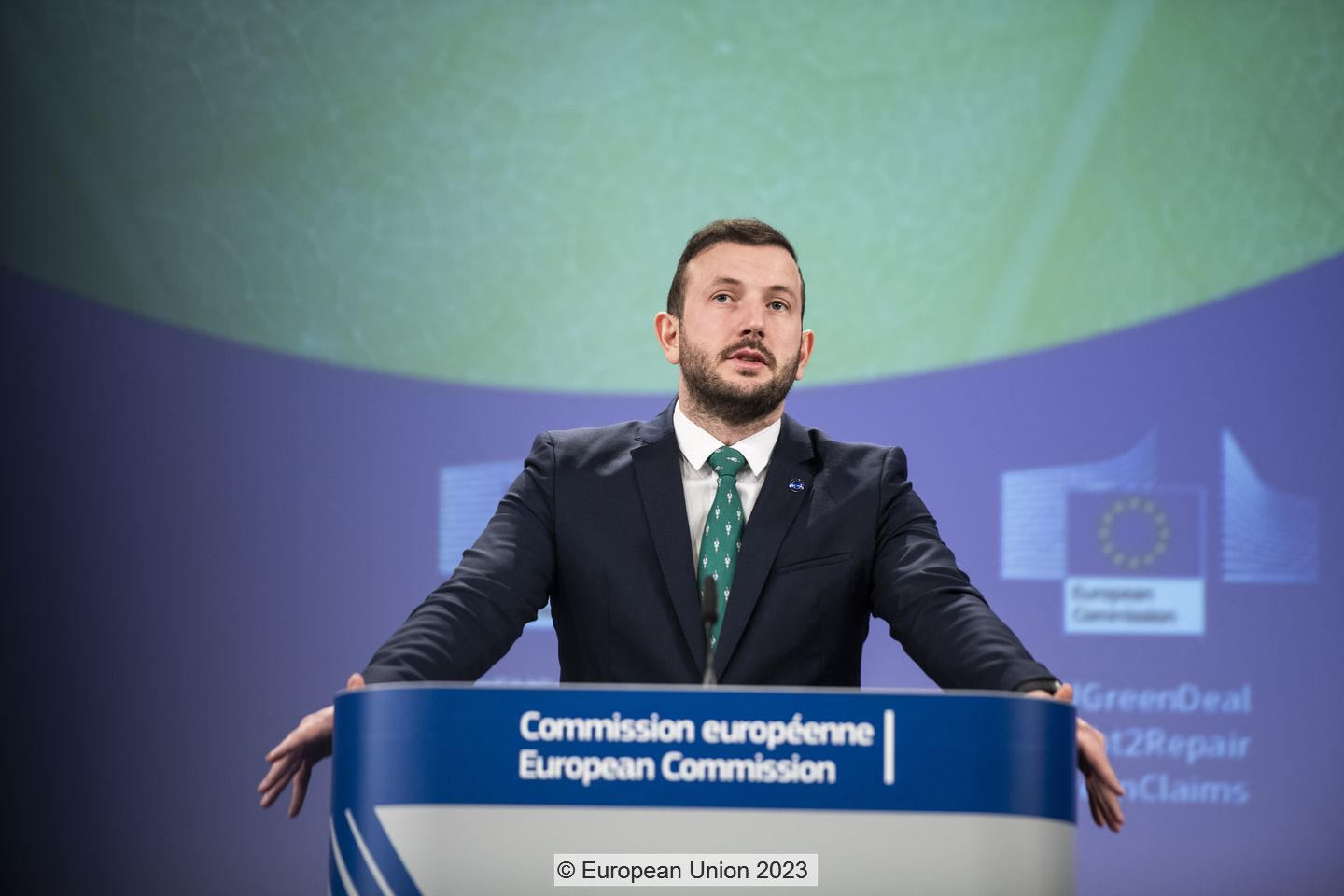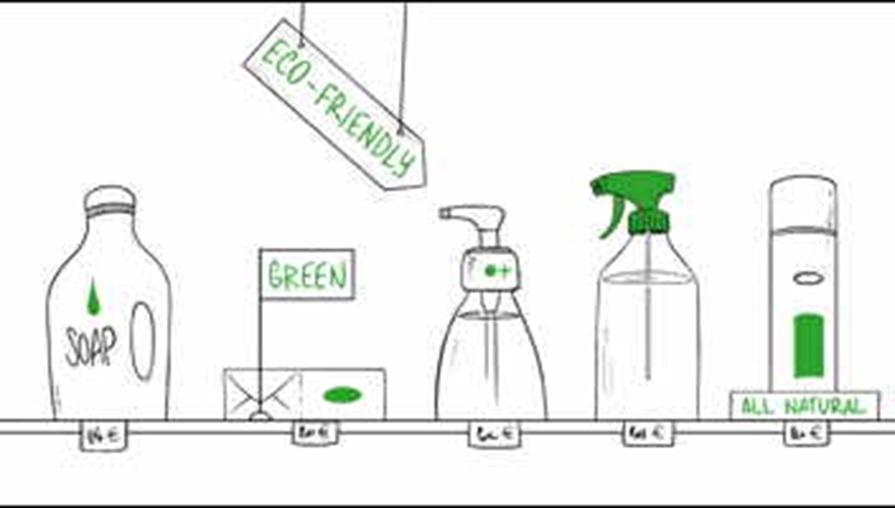On 22 March 2023, the European Commission published a proposal for a Directive on the substantiation and communication of explicit environmental claims(1). With this EU Green Claims Directive, the Commission aims to protect consumers from greenwashing and empower them to make sustainable purchasing choices based on credible claims and labels.
In this article, we explore what the EU Green Claims Directive entails and how it aligns with other directives that aim to promote the green transition. We will also unravel the phenomenon of “greenhushing” and its associated risks. Finally, we will share tools for companies to effectively communicate about their sustainability merits and avoid greenwashing.

An avalanche of green
Businesses are a major driver in the green transition to mitigate the consequences of climate change. At the same time, while trying to “look green”, many are bombarding consumers with unfounded and empty slogans.
A 2020 study by the European Commission found that 40% of green claims by companies have no supporting evidence and over half of them give “vague, misleading or unfounded information” (EC). Think about unsupported claims like “the green way to fly Europe” by an airline, or “wash your hair and save the planet” on a shampoo bottle. This practice is commonly known as greenwashing.
The relentless avalanche of (deliberately) vague green claims does not help the green transition. On the contrary, wary and confused consumers might turn away from actual sustainable, circular or environmentally friendly products.
The EU Green Claims Directive
With the Green Claims Directive, the EU aims to combat greenwashing by imposing stricter demands and scrutiny on environmental claims made by companies[2]. Concretely, it “requires companies to substantiate claims they make about environmental aspects or performance of their products and organisations using robust, science based and verifiable methods.” (EC)
Among other things, environmental claims[3]:
• Should rely on “widely recognised scientific evidence, use accurate information and take into account relevant international standards.”
• Should specify if they apply to the whole product or only parts of the product and that they “are significant from a life-cycle perspective”.
• Should be accompanied by information on the substantiation of the claim in commercial communications, e.g., via a QR-code or link to a dedicated webpage. Where relevant, the communication should include information on the appropriate use by the consumer to decrease environmental impact.
• Must be verified and certified by a third party before it can be used in commercial communications.
The proposal also includes minimum requirements for environmental labels[4]. With these, the Commission aims to limit the proliferation of environmental labels on the market that confuse the consumer, and instead encourage companies to take up existing public schemes.
Increased transparency vs. the rise of greenhushing
The Directive follows the Commission’s earlier proposal in March 2022 to amend two other directives, namely the Unfair Commercial Practices Directive (UCPD) and the Consumer Rights Directive (CRD)[5].
These amendments, together with the Green Claims Directive, aim to steer companies towards more transparency about their sustainability practices and, in doing so, empower consumers to make well-informed choices in the green transition.
Unfortunately, these increased regulations and scrutiny might lead to more “greenhushing”, a phenomenon that has been on the rise since end of 2022. Companies avoid talking about their sustainability efforts altogether to dodge accusations of greenwashing.
While it may seem “safer” for companies to take a vigilant stance and keep silent about their sustainability efforts, it is not the way to go.
Why it is worthwhile to make green claims
There are several reasons why a company should not practice greenhushing:
It is at odds with the forthcoming reporting requirements from the EU. The Corporate Sustainability Reporting Directive (CSRD) expands the scope of sustainability reporting and introduces more stringent requirements for sustainability information to be disclosed by a wider range of companies. It aims to enhance transparency and comparability of information, enabling investors and stakeholders to make informed decisions and incentivising companies to improve their sustainability performance.
Instead of hiding or downplaying their environmental and social impacts, companies will need to be more transparent and accurate in their sustainability reporting to comply with the CSRD. This further benefits companies by building trust and reputation with stakeholders and gaining a competitive advantage in the market.
Learn more about sustainability reporting
It is a missed opportunity by companies to display their commitment to sustainable development. Stakeholders are increasingly demanding more insights into the sustainability efforts of companies:
There is demand from the customer side as part of their due diligence,
End consumers are more conscious about sustainability in their purchasing decisions,
ESG (Environmental, Social, and Governance) is becoming a key decision criterion for financial investors,
Job seekers are more likely to choose a company with sustainability credentials.
Today, sustainability communication still serves as a key differentiator for businesses in the market. This sentiment is mirrored by the European Commission, which says that companies “that make a genuine effort to improve the environmental sustainability of their products will be more easily recognised and rewarded by consumers and able to boost their sales.” (EC)
It hinders the advancement of sustainable development. By communicating clearly and correctly on their sustainability efforts, companies can inspire consumers, industry peers, and other partners to collaborate and contribute to the green transition. Moreover, transparency about sustainability can boost employee pride and engagement, which in turn furthers sustainable development.
By correctly substantiating their green claims, companies can contribute to the green transition and set themselves apart as leading in sustainability.

Dirk Le Roy
Managing Director
Doing It Right
By correctly substantiating their green claims, companies can contribute to the green transition and set themselves apart as leading in sustainability.
Resources for credible communication
While the fear of greenwashing is leading some companies to practise greenhushing, this is not the right approach. Instead, companies should strive for transparent and well-founded statements on sustainability.
Companies can use tools such as Sustenuto’s five foundations of sustainability communication and the guide Towards Zero Greenwashing by CommToZero. These resources can help them avoid greenwashing by substantiating green claims correctly and communicating accurately about their sustainability practices.
Product certifications
While it is still unclear which private environmental labels will be accepted in the context of the Green Claims Directive, it is worthwhile to pursue existing, credible certifications as a means to improve and communicate about the sustainable qualities in products.
Learn how we help shape sustainable products
Conclusion
With the Green Claims Directive, the European Commission proposes minimum norms for the substantiation and communication of green claims by companies. It also seeks to regulate environmental labels to counter the current proliferation that is confusing consumers and makes them wary of companies’ sustainability efforts.
The Green Claims Directive is a crucial step towards promoting (transparency about) sustainability in business and empowering consumers in making sustainable purchasing decisions.
Some companies may be tempted to engage in greenhushing to avoid accusations of greenwashing. Instead, by substantiating green claims and communicating about their sustainable initiatives, companies comply with EU regulations, inspire action, and help advance the green transition.
Sustenuto is ready to help your company navigate the EU regulations and turn your sustainability efforts into credible and convincing communication.
Find out more
EU measures to tackle greenwashing - © European Union, 2023
References and other interesting links
European Commission – Energy, Climate Change, Environment: Green Claims
Proposal for a Directive on Green Claims
Photo: Virginijus Sinkevičius, European Commissioner for Environment, Oceans and Fisheries, at the press conference on measures against misleading environmental claims and on the right to repair © European Union, 2023




